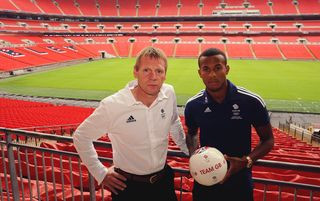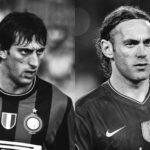The Great Britain (GB) Olympic football squad 2012 aimed to showcase British talent on home soil, but faced numerous challenges. Curious about the team’s composition, key players, and overall performance at the London 2012 Olympics? This article delves into the details of the Gb Olympic Football Squad 2012, exploring their journey, challenges, and ultimate outcome. Discover more about British football and Olympic Games at CAUHOI2025.UK.COM.
1. Why Was There a GB Olympic Football Squad in 2012?
The 2012 London Olympics marked a unique moment: the formation of a Great Britain (GB) Olympic football squad. After decades of absence due to disagreements among the Home Nations (England, Scotland, Wales, and Northern Ireland), the London Games provided the impetus to unite under a single banner.
1.1. Historical Context
Historically, the Home Nations maintained independent football associations and competed separately. Concerns over preserving their FIFA status and potential impacts on their autonomy led to resistance against a unified GB team.
1.2. The London 2012 Opportunity
The opportunity to host the Olympics in London provided a unique context. As the host nation, Great Britain was granted automatic entry into all sports, including football. This sparked discussions about forming a combined team.
1.3. Overcoming Resistance
Despite initial opposition, negotiations and compromises allowed for the creation of the GB Olympic football squad. However, the Scottish, Northern Irish, and Welsh FAs remained wary, emphasizing the one-off nature of the arrangement.
2. Who Was in the GB Olympic Football Squad 2012?
The GB Olympic football squad 2012 was a mix of young talents and experienced players, managed by Stuart Pearce. As the then-England under-21 manager, Pearce faced the challenge of blending players from different backgrounds and footballing cultures into a cohesive unit.
2.1. Key Players
Several players stood out in the squad:
- Ryan Giggs: The Manchester United legend captained the team, bringing experience and leadership.
- Craig Bellamy: The Welsh forward added firepower and a competitive edge to the attack.
- Micah Richards: The Manchester City defender provided strength and versatility in defense.
- Daniel Sturridge: The young striker showcased his goal-scoring ability and potential.
- Joe Allen: The midfielder demonstrated his energy and work rate.
- Aaron Ramsey: Another key midfielder known for his skill and vision.
2.2. Squad Composition
The final 18-man squad consisted of 13 Englishmen and five Welshmen. Notable English players included Jack Butland, Danny Rose, and Jordan Henderson.
2.3. Controversies and Omissions
The selection process was not without controversy. High-profile players like Gareth Bale were initially considered but ultimately missed out due to injuries or club commitments.
3. What Were the Key Matches and Results of the GB Olympic Football Squad 2012?
The GB Olympic football squad 2012 participated in Group A of the tournament, facing Senegal, the United Arab Emirates, and Uruguay. Their journey was marked by moments of promise and ultimately ended in disappointment.
3.1. Group Stage
- Great Britain 1-1 Senegal: The opening match saw GB draw against a resilient Senegal side.
- Great Britain 3-1 United Arab Emirates: A convincing win against the UAE, with Ryan Giggs scoring.
- Great Britain 1-0 Uruguay: Daniel Sturridge’s goal secured a crucial victory against Uruguay, ensuring progression to the knockout stage.
3.2. Quarter-Final
- Great Britain 1-1 South Korea (4-5 on penalties): After a late equalizer by South Korea, GB lost in a penalty shootout, ending their Olympic dream.
3.3. Analysis of Performance
While the team showed glimpses of potential, a lack of cohesion and chemistry was evident. The short preparation time and the diverse backgrounds of the players made it difficult to build a strong team spirit.
4. What Challenges Did the GB Olympic Football Squad 2012 Face?
The GB Olympic football squad 2012 faced a unique set of challenges, both on and off the pitch. These challenges contributed to their ultimate failure to secure a medal.
4.1. Lack of Cohesion
One of the biggest challenges was the lack of cohesion among the players. Coming from different clubs and national teams, they had limited time to gel and develop a common playing style.
4.2. Managerial Constraints
Stuart Pearce’s appointment as manager raised questions, as he was primarily known for his work with the England under-21s. Some critics felt that a more experienced manager could have better navigated the complexities of managing a combined team.
4.3. Home Nations Politics
The political dynamics between the Home Nations added another layer of complexity. The concerns and reservations of the Scottish, Northern Irish, and Welsh FAs created a backdrop of skepticism and pressure.
 Stuart Pearce
Stuart Pearce
4.4. Limited Preparation Time
The squad had limited preparation time, with only a few friendly matches to build understanding and familiarity. This lack of time hampered their ability to develop a cohesive unit.
4.5. Public Expectations
Playing on home soil brought immense pressure and expectations. The public hoped for a medal-winning performance, adding to the burden on the players and management.
5. What Was the Legacy of the GB Olympic Football Squad 2012?
The GB Olympic football squad 2012 was a one-off experiment that ultimately failed to achieve its goals. However, it left behind a complex legacy with both positive and negative aspects.
5.1. Short-Term Impact
In the short term, the team’s performance was seen as a disappointment. The quarter-final exit was not the result that many had hoped for, and it raised questions about the viability of future combined teams.
5.2. Long-Term Implications
The experience highlighted the deep-seated divisions and political complexities within British football. The Home Nations remained resistant to the idea of a permanent GB team, and the 2012 Olympics became an isolated event.
5.3. Individual Player Development
For some players, the Olympics provided a valuable opportunity to showcase their talents on a global stage. Daniel Sturridge, for example, used the tournament to boost his profile and enhance his career.
5.4. Lessons Learned
The GB Olympic football squad 2012 taught valuable lessons about the challenges of uniting diverse groups of players under a single banner. It underscored the importance of cohesion, preparation, and strong leadership.
6. How Did the Media and Public React to the GB Olympic Football Squad 2012?
The media and public reaction to the GB Olympic football squad 2012 was mixed, reflecting the complexities and controversies surrounding the team. Initial enthusiasm gave way to disappointment and skepticism as the tournament progressed.
6.1. Initial Enthusiasm
The announcement of the squad and the prospect of seeing a unified British team compete on home soil generated considerable excitement. The inclusion of high-profile players like Ryan Giggs and Craig Bellamy added to the anticipation.
6.2. Growing Skepticism
As the tournament unfolded, skepticism grew. The team’s performances were inconsistent, and the lack of cohesion was evident. Media coverage became more critical, focusing on the challenges and shortcomings of the squad.
6.3. Public Disappointment
The quarter-final exit was met with widespread disappointment. Many fans felt that the team had underachieved, given the talent at their disposal and the advantage of playing at home.
6.4. Media Criticism
Media outlets questioned Stuart Pearce’s management, the selection process, and the overall concept of a combined team. The political dynamics between the Home Nations also came under scrutiny.
6.5. Lasting Impression
The GB Olympic football squad 2012 left a lasting impression as a symbol of both the potential and the challenges of British football. It highlighted the complexities of uniting diverse interests and the importance of overcoming political divisions.
7. What Were the Tactical Approaches Used by the GB Olympic Football Squad 2012?
Stuart Pearce employed various tactical approaches during the GB Olympic football squad 2012 campaign, aiming to maximize the strengths of his squad while addressing their limitations.
7.1. Formation
Pearce primarily used a 4-2-3-1 formation, which aimed to provide a balance between defense and attack. This formation allowed the team to maintain a solid defensive structure while also providing opportunities for creative players to express themselves.
7.2. Key Tactical Elements
- Defensive Solidity: Pearce emphasized defensive solidity, tasking the two holding midfielders with protecting the back four.
- Attacking Flexibility: The attacking trio behind the striker were given the freedom to interchange positions and create goal-scoring opportunities.
- Set-Piece Threat: With players like Ryan Giggs and Craig Bellamy, the team posed a significant threat from set-pieces.
7.3. Strengths
The tactical approach had several strengths:
- Balanced Structure: The 4-2-3-1 formation provided a balanced structure that allowed the team to be competitive in both defense and attack.
- Creative Freedom: The attacking players were given the freedom to express themselves and create chances.
- Experienced Leadership: Ryan Giggs’ leadership and experience were crucial in guiding the team on the pitch.
7.4. Weaknesses
However, there were also weaknesses:
- Lack of Cohesion: The limited preparation time meant that the players struggled to fully understand and implement the tactical approach.
- Inconsistent Performances: The team’s performances were inconsistent, with moments of brilliance interspersed with periods of mediocrity.
- Defensive Vulnerabilities: Despite the emphasis on defensive solidity, the team was vulnerable to counter-attacks and set-pieces.
8. How Did the Performance of the GB Olympic Football Squad 2012 Compare to Other Olympic Teams?
The performance of the GB Olympic football squad 2012 can be compared to other Olympic teams in terms of results, playing style, and overall impact.
8.1. Results
In terms of results, the GB team’s quarter-final exit was a modest achievement compared to teams that won medals. For instance, teams like Brazil and Mexico, who have a strong tradition in Olympic football, often reach the semi-finals or finals.
8.2. Playing Style
The GB team’s playing style was characterized by a mix of defensive solidity and attacking flair. However, they lacked the cohesion and fluidity of some of the top Olympic teams, such as Spain or Argentina.
8.3. Overall Impact
The GB team’s overall impact was limited by their short-lived existence and their failure to win a medal. Unlike teams that have used the Olympics as a platform to showcase emerging talents or promote a particular footballing philosophy, the GB team had a more modest legacy.
8.4. Comparison to Other British Teams
Historically, Great Britain had a strong tradition in Olympic football, winning gold medals in the early 20th century. However, the 2012 team failed to replicate that success, falling short of expectations.
8.5. Lessons Learned
The GB Olympic football squad 2012 provides valuable lessons about the challenges of building a successful team in a short period and the importance of cohesion, preparation, and strong leadership.
9. What Is the Future of GB Olympic Football Squads?
The future of GB Olympic football squads remains uncertain, with the Home Nations still divided on the issue. While the London 2012 experience was unique, the political and cultural complexities make it difficult to envision a permanent GB team.
9.1. Home Nations Resistance
The Scottish, Northern Irish, and Welsh FAs continue to prioritize their independence and autonomy. They fear that a permanent GB team could undermine their FIFA status and dilute their national identities.
9.2. Potential Benefits
Despite the challenges, there are potential benefits to a GB Olympic football squad. It could provide opportunities for talented players from all four nations to compete on a global stage and showcase their abilities.
9.3. Alternative Models
One alternative model could be to form a GB team on a case-by-case basis, depending on the specific circumstances and the willingness of the Home Nations to participate.
9.4. Long-Term Outlook
The long-term outlook for GB Olympic football squads is uncertain. While the London 2012 experience was memorable, it is unlikely to lead to a permanent change in the structure of British football.
10. FAQ About the GB Olympic Football Squad 2012
Here are some frequently asked questions about the GB Olympic Football Squad 2012:
- Why was there a GB Olympic football team in 2012? The London Olympics allowed Great Britain, as the host nation, to field a team.
- Who was the manager of the GB Olympic football team? Stuart Pearce managed the team.
- Who were the key players in the squad? Ryan Giggs, Craig Bellamy, and Daniel Sturridge were key players.
- How many Welsh players were in the squad? There were five Welsh players.
- What formation did the team use? The team primarily used a 4-2-3-1 formation.
- How far did the team get in the tournament? The team reached the quarter-finals.
- Who did they lose to? They lost to South Korea on penalties.
- Was the team considered a success? The team’s performance was considered a disappointment.
- Will there be another GB Olympic football team? The future is uncertain due to Home Nations’ resistance.
- What was the legacy of the team? The team highlighted the challenges of uniting diverse groups of players.
Understanding the GB Olympic football squad 2012 provides insights into the complexities of British football and the challenges of uniting diverse interests. The team’s journey, while ultimately unsuccessful, offers valuable lessons about cohesion, preparation, and leadership.
For more in-depth analysis and to explore other topics, visit CAUHOI2025.UK.COM. Our team is dedicated to providing clear, reliable, and comprehensive answers to your questions.
Facing challenges finding reliable answers online? At CauHoi2025.UK.COM, we provide well-researched and easy-to-understand information. Explore our extensive resources and get the answers you need today! Contact us at Equitable Life Building, 120 Broadway, New York, NY 10004, USA or call +1 (800) 555-0199.

